CBSE Previous Year Question Papers Class 12 English 2019 Outside Delhi
Time allowed : 3 hours
Maximum marks: 100
True
- This paper is divided into three sections : A, B and C. All the sections are compulsory.
- Separate instruction are given with each section and question, wherever necessary. Read these instructions very carefully and-follow them faithfully.
- Do not exceed the prescribed word limit while answering the questions.
False
– Item – Item – Item – Item – Item – Item – Item – Item – Item – Item – Item – Item – Item – Item – Item – Item – Item – Item – Item – Item – Item – Item – Item – Item – Item – Item – Item – Item
SECTION – A
30: (READING) 30: (READING) 30: (READING) 30: (READING) 30: (READING) 30: (READING) 30: (READING) 30: (READING) 30: (READING) 30: (READING) 30: (READING) 30: (READING) 30: (READING) 30: (READING) 30: (READING) 30: (READING) 30
Question 1.
Read the passage given below and answer the questions that follow: [20]
"the blood of humanity spilling all over the sky from earth": sage of science, Einstein . he was deeply hurt and depressed when he heard on the radio that America had dropped an atom bomb on Hiroshima . today, in three days another bomb was dropped on another city, Nagasaki and lakhs of people had been killed .
False
False
4. He could not sleep that night. Lying down, he was thinking how he had drawn the attention of the then American President Roosevelt towards the destructive powers of an atomic bomb. He had thought that this would be used to scare Hitler and put an end to the barbarism that Hitler was up to. However, Roosevelt kept him in the dark and made false promises. Eventually, he had abused Einstein’s equation of E = mc 2 that resulted in the destructive experiments. His actions had made science and scientists as murderers. Einstein kept on thinking for a long time. Eventually, he slipped into sleep. When he woke up at dawn, there was a new dawn in him too. The atomic threat had transformed his heart.
False
False
False
Question 1.1.
On the basis of your understanding of the above passage, answer each of the questions given below by choosing the most appropriate option : [1 × 5 = 5]
(a) Besides two great philosophers how many other scientists were invited by Einstein to inaugurate the institution where spirituality would be compulsorily taught?
(i) Five
(ii) Ten
(iii) Eight
(iv) Fifteen
Answer:
(ii) Ten
(b) Which musical instrument did Einstein play when he was in grief?
(i) Harmonium
(ii) Guitar
(iii) Violin
(iv) Flute
Answer:
(iii) Violin
(c) Einstein came to know that America had dropped an atom bomb on the Japanese city, Hiroshima through
(i) television
(ii) newspaper
(iii) radio
(iv) a telephonic message
Answer:
(iii) Radio
(d) Which American President was told about the destructive power of an atomic bomb?
(i) Kennedy
(ii) Bill Clinton
(iii) Lincoln
(iv) Roosevelt
Answer:
(iv) Roosevelt.
(e) Einstein said to the Japanese delegation,
(i) “You can give me any punishment and I will accept it.”
(ii) “I am not at fault.”
(iii) “What could I do?”
(iv) “The President didn’t agree to my advice.”
Answer:
(i) “You can give me any punishment and I will accept it.”
Question 1.2.
Answer the following questions briefly: [1 × 6 = 6]
(a) What did Einstein do to overcome his distress after getting the news of the atomic attack?
(b) Which event in 1945, according to Einstein, turned science and scientists into murderers?
(c) What did Einstein do to show his displeasure over the atomic attack?
(d) Whose photo was garlanded at the inauguration of Einstein’s institute for children, adolescents and youth?
(e) Name the philosophers that Einstein invited to inaugurate the new institution.
(f) Why did Einstein want harmony between science and spirituality while teaching in educational institutes?
Answer:
(a) Einstein was extremely distressed after getting the news of the atomic attack. To distract his mind from this serious news, he picked up his violin and began playing sad notes on it. He did not even eat for four days.
(b) In 1945, America had dropped atom bombs on the Japanese cities of Hiroshima and Nagasaki. The bombs made to scare Hitler and put an end to barbarism had been misused to kill many innocent lives. This event according to Einstein, turned science and scientists into murders.
(c) To show his displeasure over the atomic attack, Einstein decided to disassociate himself from the scientific policy of the government and all its institutions. He decided to open educational institutions where science and spirituality would be compulsorily taught to children, adolescents and youth.
(d) The photo of Mahatma Gandhi was garlanded at the inauguration of Einstein’s institute for children, adolescents and youth.
(e) Two great philosophers, Bertrand Russell and Albert Schweitzer were invited by Einstein to inaugurate the new institution.
(f) Einstein’s fear of destruction due to the atomic bomb attacks transformed his thinking. He felt the need for bonding between science and spirituality to bring about harmony. This could bring a decrease in destruction of life and peace would prevail in the world.
Question 1.3.
Answer any three of the following questions in 25-30 word each: [2 × 3 = 6]
(a) What did Einstein feel while looking at the sunset from his room’s window?
(b) Give a brief description of the disaster when the atomic bomb was dropped on the Japanese city, Nagasaki.
(c) What did Einstein think of Mahatma Gandhi?
(d) What was Einstein’s reaction when the Japanese delegation met him?
Answer:
(a) Einstein with tears brimming from his eyes and pain evident in his face, peeped out of the window of his room. Looking at the sunset, he felt the sinking of humanity into a devilish darkness and the reddish glow in the sky felt like human blood spilling all over the sky from the earth. He was tom apart.
(b) The explosion at Nagasaki caused death, burning, melting and exploding of buildings. The water in the lakes and rivers was boiled hot leading humans as well as aquatic animals to death. All living and non-living things were turned into ashes.
(c) Einstein thought of Mahatma Gandhi as a great man who used non-violence as his tool while fighting for his country’s independence. Einstein referred to the Mahatma as a truthful and spiritualist man.
(d) Einstein, on meeting the Japanese delegation, broke down and announced that he was ready for any punishment given to him. He also spoke of his decision to lead the rest of his life in penitence.
Question 1.4.
Find words/phrases from the passage which are similar in meaning to each of the following : [1 × 3 = 3]
(a) mental pain (para 1)
(b) agreement (para 7)
(c) regret/remorse (para 7)
Answer:
(a) agony
(b) harmony
(c) penitence
Question 2.
Read the passage given below carefully and answer the questions that follow: [10]
1. To live in harmony with oneself and the environment is the wish of every human. However, in modem times greater physical and emotional demands are constantly placed upon many areas of life. More and more people suffer from physical and mental tension such as stress, anxiety, insomnia, and there is an imbalance in physical activity and proper exercise. This is why methods and techniques for the attainment and improvement of health, as well as physical, mental and spiritual harmony, are of great importance, and Yoga meets this requirement.
True
True
True
True
True
Question 2.1.
On the basis of your understanding of the above passage, make notes on it using headings and subheadings. Use recognizable abbreviations (wherever necessary — minimum four) and a format you consider suitable. Also supply an appropriate title to it. [5]
Question 2.2.
Write a summary of the above passage in about 100 words. [5]
Answer:
TITLE : YOGA IN DAILY LIFE
1. Need for Yoga
(i) Decreases mental and physical stress in daily life
(ii) Attnt. and improv. of physical and mental health and spiritual harmony
2. Benefits of Yoga
(i) Bal. of body, mind, consciousness and soul
(ii) Cope with daily probs.
(iii) Supreme knwldg. of union of indvl. self and univ. self
3. Practice of Yoga
(i) Practical instructions for – body, breathing, concentration, relaxation, meditation
(ii) Taught worldwide in Yoga Centres, Health Institutions, Rehabilitation Centres etc.
4. Yoga in daily life
(i) Use of yoga daily for positivity in life
(ii) Holistic system, considers physical, mental and spiritual aspects
True
True
SECTION – B
30: (ADVANCED WRITING SKILLS) 30: (ADVANCED WRITING SKILLS) 30: (ADVANCED WRITING SKILLS) 30: (ADVANCED WRITING SKILLS) 30: (ADVANCED WRITING SKILLS) 30: (ADVANCED WRITING SKILLS) 30: (ADVANCED WRITING SKILLS) 30: (ADVANCED W
Question 3.
You are Dhruv/Deepa. Your father, Shri Dheeraj Garg of Gurugram wants you to draft an invitation to be sent to friends and relatives on the occasion of your elder sister’s marriage. Prepare the invitation giving necessary details in not more than 50 words. [4]
OR
Water is precious and each one of us must stop its wastage to avoid its scarcity in the near future. Prepare a poster requesting people of your colony to adopt means to save water, prevent its wastage, etc. You are Rama/Rohan of Ashima Vihar, Saket, Ahmedabad. (50 words)
Answer:
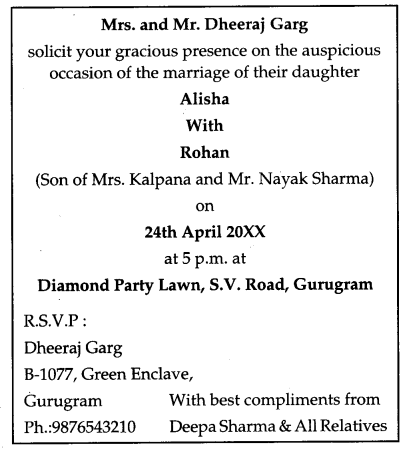
OR

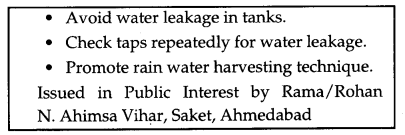
Question 4.
Kerala was badly hit by floods due to heavy rains. Even today the victims are suffering financially, physically and mentally. Write a letter in 120 – 150 words to the Editor. ‘The Times of Kerala’ giving details of the loss of life and property. Also, make an appeal to the people and the Government to provide help and relief to the afflicted. You are Varun/ Vandana, 31 Shastri Nagar, Trichi. [6]
OR
You are Shobha/Sushil from 56, A BIOCK, Saket, Agra. Write an application along with a personal resume in 120-150 words in response to the following advertisement.
Wanted an experienced hockey coach having B.P.Ed Degree for our school. Apply to the Principal, Agarsen Public School, Agra by 15th March, 2019.
Answer:
31 Shastri Nagar,
Trichi
3rd March 20XX
The Editor
The Times of Kerala
Thiruvandapuram
Subject: Relief for survivors of floods in Kerala
Sir/Madam,
Through the columns of your esteemed and widely read newspaper, I would like to highlight the present conditions of the people affected by the floods that devastated Kerala last year.
The floods that caused a lot of death and destruction in ‘God’s own land, has left behind a trail of victims a year after it wreaked havoc in the state. These survivors of the flood are still struggling to deal with the consequences on their own. They are dealing with the physical damage as well as the mental and emotional trauma that comes with having survived the event without those that are dear to them. These people have lost their livelihood and some have even lost mobility and structure.
I request you to highlight their plight in the newspaper. They are in need of the basic necessities and more. Any help offered by the government and the people reading this, would make a world of change in their lives.
Yours respectfully,
Varun/Vandana
OR
56, A Block, Saket Agra
10th March 20XX
The Principal
Agarsen Public School
Agra
Subject : Application for the post of hockey coach.
Sir/Madam,
In response to your advertisement in the Indian Express dated 5th March, 20XX for the position of hockey coach, I hereby offer my candidature for the same. I believe that my experience and background fit your requirements for the position.
I have had the pleasure to be the hockey coach at St. Stephen’s College, Delhi for the last five years and the pleasure of assisting the esteemed coach Pramod Srivastav at Tripti High School for four years as well. I have two Bachelor’s degrees, one in Physical education and another in Education. Coaching students has been my passion and I am sure that I can work well with the team. Both the teams I have worked with previously have been able to play in multiple competitions statewide. I have received positive feedback from the students, the parents and the school.
You may call me for an interview on any date as per your convenience. I shall be able to join my duties at one month’s notice if appointed. As requested, I have enclosed my resume with this letter.
Yours sincerely,
Shobha /Sushil
Encl.: Resume
RESUME
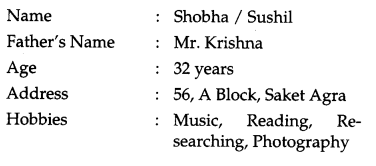
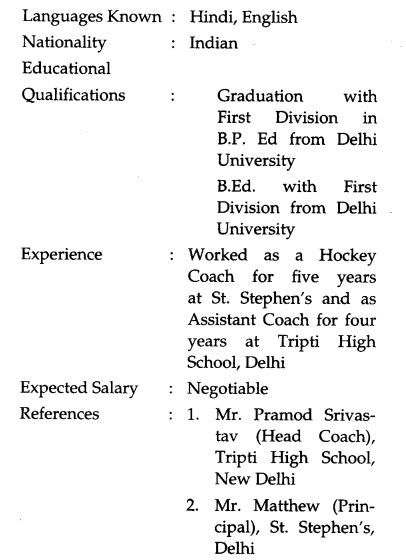
Question 5.
You are concerned about the cleanliness of parks, roads and even your school premises. In spite of various measures taken by local and school administration, lack of cleanliness is still a problem. You are Namita/Keshav. Prepare a speech in 150-200 words to be delivered in the morning assembly of your school on the topic, ‘Cleanliness is the Responsibility of All/ [10]
OR
Write a debate in 150 – 200 words either for or against the motion:
‘Stray dogs should not be put to sleep’.
Answer:
CLEANLINESS IS THE RESPONSIBILITY OF ALL
Honorable Principal, teachers and all my dear friends, Good Morning to all!
I am Keshav/Namita of class XII C. It’s a great honour for me to stand before everyone and deliver a speech on the importance of cleanliness. Today, I would like to address the idea of cleanliness in our locality. Specifically, I would like to talk about cleanliness in public spaces such as parks and roads as well as other spaces that host large groups of people simultaneously such as our school.
False
It is important that each of us as citizens do our part in maintaining the cleanliness of our surroundings. It can be as simple as picking up any piece of paper we drop or making sure that the things we are throwing away are inside the wastebaskets. These small steps can have a large impact, so to all of us, I say it is time for us to stop thinking of the idea of cleanliness and start doing what we can to make a clean and healthy environment a reality. Thank you.
OR
STRAY DOGS SHOULD NOT BE PUT TO SLEEP
True
timothy stanley: stray dogs that roam in the streets should be seen as the dogs that have not had the love and care that animals need to survive . stanley: studies have shown that most stray dogs have lesser health problems and are friendlier when given love and attention . stanley: we should spread awareness about these beautiful God’s creation and encourage people to adopt them .
False
Question 6.
Abundance of advertisements in newspapers, magazines and even on television is a wastage of both time and money of readers and viewers. You are Shobha/Sameer. Write an article in 150 – 200 words on the topic, ‘Excessive Use of Advertisements in Media’. [10]
OR
An NGO, ‘Health for All’ organised a health check-up camp in a slum at Amritsar. You are Ruchika/Raunak, and you visited the camp. Write a report in 150-200 words covering arrangements such as registration, check-up, tests carried out, etc.
Answer:
EXCESSIVE USE OF ADVERTISEMENTS IN MEDIA
By Shobha/Sameer, XIIA
Mark Twain once said, “Many a small thing has been made large by the right kind of advertising”. Today’s media platforms contain more ads than the content itself and this applies to all form of media that we choose to entertain ourselves with. To the media, advertising is more profitable than the content they provide.
True
Taking everything into account, it is important to note that reducing the amount of advertising present in the media might have a positive impact. Perhaps, the space allotted to advertisements can be kept as a percentage of information and content presented in order to ensure that the content takes precedence over the advertisements.
OR
HEALTH CHECK UP CAMP IN A SLUM
By Ruchika/Raunak
Amritsar, March 20XX : A health camp was organised in a slum in Amritsar by the NGO ‘Health for All.’ The camp was set up in such a way that each person who opted to get the health checkup first had to register at the counter by giving his name and age. Once the check-up was completed, the people were requested to submit the forms at the registration desk.
True
. . . . . . . . . . . . . . . . . . . . . . . . . . . . . . . . . . . . . . . . . . . . . . . . . . . . . . . .
SECTION-C
(LITERATURE : TEXTBOOKS AND LONG READING TEXT) 40
Question 7.
Read the extract given below and answer the questions that follow : [1 × 4=4]
Perhaps the Earth can teach us
as when everything seems dead
and later proves to be alive.
Now I’ll count up to twelve
and you keep quiet and I will go.
(a) Name the poem and its poet. [1]
(b) What does the Earth teach us? [1]
(c) What does the poet want to achieve by counting up to twelve? [1]
(d) Give an example of what now seems to be dead but later on becomes alive. [1]
OR
A thing of beauty is a joy forever
Its loveliness increases, it will never
Pass into nothingness; but will keep
A bower quiet for us, and a sleep
Full of sweet dreams, and health, and quiet breathing.
(a) Name the poem and its poet. [1]
(b) How does a thing of beauty remain a joy forever? [1]
(c) Explain : ‘never pass into nothingness’. [1]
(d) How does the bower help us in our life? Give two examples. [1]
Answer :
(a) The poem is ‘Keeping Quiet’ and the poet is Pablo Neruda.
(b) The earth teaches us to be patient, productive and to live in tranquility.
(c) The poet wants to enlighten us on the importance of patience and meditation by counting up to twelve. By remaining still and through reasoning, we can achieve to be positive and overthrow the negativity within us.
(d) A seed when falls into the earth and dies, grows into a plant which bears fruit, gives shade when it grows into a tree, and helps the environment.
OR
(a) The poem is ‘A Thing of Beauty’ and the poet is John Keats.
(b) A thing of beauty is eternal as it revives our memories and leaves a positive influence on our minds. As time passes by, its beauty only increases with time. This only helps in providing everlasting joy to the eye of the beholder.
(c) Joy that lasts in beauty is everlasting, its importance never diminishes but grows with time.
(d) Bower is a peaceful dwelling place that helps us is our life. Under the shade of the tree, it provides us protection from the sun and rain. It is also a safe and quiet place for rest and meditation.
Question 8.
Answer any four of the following question in 30 – 40 words each : [3 × 4 = 12]
(a) ‘Garbage to them is gold.’ Why does the author say so about the ragpickers of Seemapuri?
(b) Which two incidents in Douglas’ early life made him scared of water ?
(c) Why was the crofter so talkative and friendly with the peddler?
(d) “It ate my face up. It ate me up.” Who said these words? Why?
(e) Why did Evans not take off his hat when Jackson ordered him to do so?
(f) Why did Zitkala-Sa resist the shingling of her hair?
Answer:
(a) Rag picking is a means of survival to the ragpickers of Seemapuri. They sell all that they pick from the heap of garbage in exchange for money to meet their needs. At times, they even find currency notes and coins in it. To these ragpickers, garbage is equivalent to treasures of gold.
(b) At the age of three or four, Douglas was knocked down by strong waves of the Yakima river. As a result, Douglas was almost buried Under water, and got breathless. Later, at the age of ten or eleven, he was tossed in the YMCA pool by a senior where he ended up swallowing water. These two incidents played a powerful role in developing Douglas’ aversion to water.
(c) The crofter was a lonely old man living all alone with no family. He craved for a human company. Therefore, when the peddler requested the old man for shelter, the old man, in his generosity and need for someone to talk, welcomed the peddler for supper.
(d) Derry showing his inferiority complex, says these words since he is often singled out by people as an ugly poor boy due to his acid- burnt face. As a result of his injury and the behavior of the people in his community, he looks down upon him self as an outcast.
(e) Evans had long wavy hair and covered it with a hat as after the exam he was going to impersonate Mcleery and escape from the prison. Mcleery had short hair so Evans had cropped up his hair and did it under the hat. He confided in Jackson that the hat was the only lucky charm that had brought him luck in his life and so refused to take off his hat.
(f) Zitkala-Sa had learned from her mother that hair shingling was done only to unskilled captured warriors by the enemy. In her family, short hair was considered to be a sign of mourning and cowardice.
Question 9.
Answer any one of the following questions in 120 -150 words : [6]
(a) Everybody during the last lesson was filled with regret. Comment.
(b) Why is the Champaran episode considered to be the beginning of the Indian struggle for independence?
(c) It is not unusual for a lower middle class girl to dream big. How unrealistic were Sophie’s dreams?
Answer:
(a) The story, “The Last Lesson” is set during the Franco-Prussian War when the French districts of Alsace and Lorraine passed into the hands of Prussia. The Prussian government then made the declaration that only German was to be taught in the schools in Alsace and Lorraine. This order affected the local public badly and each one of them was repenting for wasting time and not learning French. Each person in the class was filled with regret. The French language teacher, M. Hamel felt guilty for sending his students to complete his personal tasks. The parents of the students never bothered to send their children to class but instead preferred that the children work on the farm or at mills. Even the older people in the room like old Hauser, the former mayor, the former postman and other elders of the village showed regret on neither learning French themselves nor encouraging their children to learn the language.
india was under the suzerainty of the British power for more than a hundred years before the incident at Champaran . the peasants learned about the development of synthetic indigo, they demanded for their money . Gandhiji managed to get the amount back and provided courage to the peasants .
Sophie the protagonist of "Going Places" comes from a lower middle-class background . like most girls, she tends to have escapist tendencies . her best friend Jansie and her family try to limit her from day dreaming .
Question 10.
Answer any one of the following questions in 120-150 words: [6]
(a) Describe the efforts made by the Tiger King to achieve his target of killing a hundred tigers.
(b) Explain the reaction of Dr. Sadao’s servants when he decided to give shelter to an enemy in the house.
(c) Describe Jack’s art of storytelling.
Answer:
(a) The Maharaja of Pratibandapuram was known as the Tiger King. At the time of his birth, the astrologers had declared that the prince would die one day. At that prophecy, the ten-day-old prince asked the astrologers to reveal the manner of his death. The wise men, though baffled by this miracle, declared that the prince’s death would come from a tiger. When the Prince came of age, he took matters in his own hands and killed a tiger. On sharing these details with the astrologer, he stated that it did not mean that the King was safe. As a matter of fact, he must be careful about the hundredth tiger. Thereafter, the King decided to kill a hundred tigers. He, thus, got the name ‘Tiger King’. In his initial years as a king, he killed around seventy tigers. He also killed around twenty-nine tigers in the forest belonging to his father-in-law. Somehow a hundredth tiger was arranged for him to kill but the tiger did not die when it was shot. Later, the soldiers killed the tiger and with this, the King achieved his dream of killing a hundred tigers.
During the war, he was not sent along with the other troupes because the General was under his treatment and needed his services . on one occasion, he saw an injured young american soldier in need of his help . the servants finally chose to leave the house altogether .
Jack aims to express his wisdom, art and creativity infused with cunningness through his stories . his stories more or less follow one pattern with minor variations depending on the theme for the day . each story begins and describes a Roger who may be a squirrel, a fish or a chipmunk . the stories also have a wise owl and a magic wand wielding wizard .
Question 11.
Answer any one of the following questions in 120-150 words : ** [6]
(a) Describe the burglary that took place at Mr. Bunting’s house. (The Invisible Man)
(b) How did Griffin move about in the village of lping?
(c) Why does Silas return to Lantern Yard after having lived and prospered at Raveloe? How does his visit prove useful to him?
(d) How was Silas transformed completely with the arrival of a child?
Question 12.
Answer any one of the following questions in 120 -150 words : ** [6]
(a) Describe Nancy Lammeter’s personality and approach to life. (Silas Marner)
(b) Writer a character sketch of Godfrey Cass. (Silas Marner)
(c) Marval is the only character in ‘The Invisible Man’ who interacts with Griffin and gains something. Elaborate.
(d) How did Dr. Kemp use the information given to him by Griffin himself to get him arrested? Was he successful in doing so?
paraphrase: CBSE paraphrase: CBSE paraphrase: CBSE paraphrase: CBSE paraphrase: CBSE Paraphrase: CBSE Previous Year Question Papers CBSE Previous Year Question Papers CBSE Previous Year Question Papers CBSE Previous Year Question Papers Class 12 English 2019 Outside Delhi Set – II
False
SECTION – B
(ADVANCED WRITING SKILLS)
Question 4.
The elderly living alone in cities are not safe. Reports of violence against them are really very disturbing. The recent murder of two elderly persons has rocked the city. It seems the police are not taking adequate steps to make the elderly feel safe and secure. Write a letter in 120-150 words to the Editor, ‘Modern Times’ to draw the attention of the law and order authorities to the problem and take effective steps to deal it. You are Sohan/Sangeets, 12, Roshan Colony, Alampur. [6]
OR
You have read an advertisement in the newspaper, ‘Pune Times’ for the post of software engineer in Alex Software, Pune. You believe that you possess the requisite qualifications and experience and your innovative ideas will prove an asset to the company. Write an application in 120-150 words emphasising your strong points and your suitability for the post. Also include your biodata. You are Saurabh/Shikha, 12, Mall Road, Chandigarh.
Answer:
12 Roshan Colony,
Alampur
3rd March 20XX
The Editor
Modem Times
Alampur
Subject : Safety precautions for the elderly in the city.
Sir/Madam,
Through the columns of your esteemed newspaper, I, on behalf of the residents of Roshan Colony, wish to bring to your kind attention, the murder of the two elderly people that have taken place recently. As a resident of the area in which the attack took place, I write to point out the lack of protection that the seniors are offered.
The recent murders, while brutal, are not a surprising phenomenon considering the lack of proper precautions taken to ensure the safety of the elderly. While I mourn the loss of the two souls that were attacked, I also fear for those who are still with us. It is even more surprising to see that despite these attacks, very little is done to ensure their safety. It is important, in today’s times that the authorities take proper precaution for those in our communities who are the most vulnerable i.e., the elderly.
I believe that highlighting it through your newspaper would bring it to the attention of the proper authorities so that they can take appropriate and legal steps to ensure the safety of the elderly at the earliest.
Thanking you,
Yours respectfully,
Sangeeta/Sohan
OR
12, Mall Road
Chandigarh
10th March 20XX
The Manager
Alex Software
Pune
Subject: Application for the post of a Software Engineer
Sir/Madam,
In response to your advertisement in the Pune Times dated January, 20XX for the post of a software engineer, I hereby offer my candidature for the same. I believe that my skills and qualifications match your requirements.
I have worked as a software engineer at GnC for the last eight years. It has been my dream to work in this sector which is playing such an important role in the development of society. My area of specialty is user interface and coding. I have been appreciated for my efficiency by my previous employers. If given the opportunity, I am sure I will be able to prove my capabilities to you as well.
I would be glad to get this opportunity and speak more about my work in a personal interview. I am available to come to Pune at your convenience. Thank you so much for reading my letter and for considering me for this position. I am enclosing my detailed resume for your perusal.
Sincerely,
Shikha / Saurabh
Encl. : Detailed Resumeand Work Experience
Certificate
RESUME
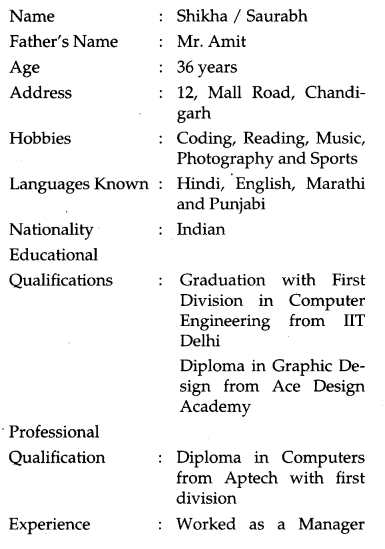
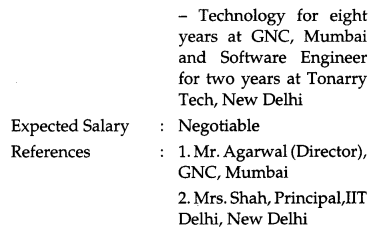
Question 5.
Career conscious students focus primarily on academics and neglect participation in games and sports, not realising how important physical activities are. You are Vineet/Vinita. Prepare a speech in 150-200 words to be delivered in the morning assembly of your school on the topic, ‘Balancing Academics and Sports/ [10]
OR
Write a debate in 150-200 words either for or against the motion: 21
st
century is an age of greed’.
Answer:
BALANCING ACADEMICS AND SPORTS
Dear audience, Good morning to all. I, Vineet/ Vinita, feel extremely happy as it’s a matter of great privilege for me to deliver a speech on the topic, “Balancing Academics and Sports”.
Today is a beautiful day for playing outside, and yet, many of our students and my fellow classmates, will skip the chance to play in favour of another round of revision of our study materials. This is done in hopes of improving their scores and having a better career, a better future. However, in doing so, they are ignoring one very important factor that is essential for a successful future i.e., health.
While pulling away from the books to play or participate in sports for a while might sound like a huge sacrifice, it is a necessity. Finding a balance between sports and academics ensures success in the future. It has been proven that our brain cannot process all the information given to it without breaks. Sports and other physical activities help our brain process things faster. Focusing solely on academics leads to anxiety, distress and depression in students.
I would like to conclude this speech by saying that health is something to be treasured, we can never regain it if lost. Hence, Sports should be an integral part of the curriculum. Focusing all our energy on academics at such a crucial age can have a huge effect that can change our lives. Thanks to all for being so generous in listening to my views so attentively and patiently.
OR
21
ST
CENTURY IS AN AGE OF GREED
Respected chairperson, members of the jury and my worthy opponents, I, xyz of class XII am glad to have the opportunity today to argue against the motion that “21st Century is an age of greed”.
True
True
SECTION – C
(LITERATURE : TEXTBOOKS AND LONG READING TEXT)
Question 8.
Answer any four of the following questions in 30 – 40 words each: [3 × 4 = 12]
(a) What are the two most admirable qualities in Mukesh ?
(b) What is wrong with Jansie’s outlook on life?
(c) What does Neruda wish fishermen and warmongers to do ?
(d) How is the Derry we meet at the beginning different from the Derry at the end ?
(e) Why was the General apologetic when Sadao told him that the prisoner had escaped?
(f) Why did Zitkala-Sa oppose tooth and nail the shingling of her long hair ?
Answer:
(a) Two admirable qualities in Mukesh are that he dares to dream and is focused on achieving them. Mukesh refuses to accept his destiny as a bangle-maker like his father and ancestors. He is ready to walk the long distance from his house to the garage where could learn to be a motor mechanic which he aims to be.
(b) Jansie is too pragmatic towards how she percieves things to be. She is not flexible about her dreams and believes that she will continue to be in the position that they currently live in Jansie is realistic and constantly keeps Sophie’s day-dreaming in check.
(c) Neruda is a lover of peace and non-violence. He wishes that the fishermen do not hunt the whales in the cold regions. He also wishes that the warmongers who normally indulge in wars and violence, walk with their brothers in some of their best clothes in the shade of trees, doing nothing.
(d) Derry at the beginning of the story is a very negative person and because of his ugly appearance, hides away from the crowds. He believes that the acid has eaten his skin and him alive. He feels that he doesn’t need any second chance to live. However, Derry at the end of the story is more optimistic and practical. He decides to live happily by being friendlier with people.
(e) The General believed that Sadao was indispensable to his life as none were as skilled as Dr Sadao. When Sadao told him about the prisoner who had escaped, he was apologetic as he had forgotten about his promise of sending assassins to kill the enemy, that he made to Sadao, in his greed and selfish needs.
(f) Zitkala-Sa opposed tooth and nail the shingling of her long hair because she remembered her mother’s words. Her mother told her that shingling of the hair was done to the prisoners of the war. In their culture, only mourners and cowards kept short hair.
paraphrase:: CBSE Paraphrase:: CBSE Paraphrase:: CBSE Previous Year Question Papers CBSE Previous Year Question Papers CBSE Previous Year Question Papers CBSE Previous Year Question Papers CBSE Previous Year Question Papers CBSE Previous Year Question Papers Class 12 English 2019 Outside Delhi Set – III
True
SECTION – B
(ADVANCED WRITING SKILLS)
Question 5.
Respect for law, concern for others and maintaining a clean environment are some of the qualities of a civilized person. It is sad that we do not pay much attention to them. You are Shoma/Sonu. Write a speech in 150-200 words to be delivered in the morning assembly on the topic, ‘Importance of Civic Sense’. [10]
OR
Write a debate in 150-200 words either for or against the motion:
‘Money is the only thing that matters in today’s life’.
Answer:
IMPORTANCE OF CIVIC SENSE
Dear Friends and Faculty, I, Shoma/Sonu of class XII-C, wish all of you a very good Morning. I am privileged to present my views on the importance of civic sense with you today.
False
True
We live in a time where we stand at the edge of irreversible changes. In such a time, it becomes more important than ever that we hold on to our civic sense. If we continue to live as individuals rather than a society on this planet, just functioning based on rules that ensure our mere survival, then there will come a time when the society will never be the same. Knowing this, it becomes even more important to emphasize the importance that civic sense can have in our very lives. It is high time that we all start to live with civic sense and social mannerism for a cleaner and healthier environment. This will help us change the society at the earliest.
Thank you.
OR
True
True
True
Question 6.
The tendency to use violence at the slightest provocation and thus to solve personal and general problems is growing among people in our society. This is not a civilized way of dealing with the problems. Violence solves no problem; it must be shunned. Write a article in 150-200 words on the topic, You are Shan/ Shobha. [10]
OR
The Fine Arts Club of your school celebrated its tenth anniversary in a grand manner. Distinguished artists Pt. Jasraj, Hariprasad Chaurasia and the veteran Kathak dancer Shovana Narayan graced the occasion and enthralled the audience by their mesmerizing compositions. Shovana Narayan’s graceful movements were a delight to watch. The function ended with two lilting songs by Shambu, a class 10
th
student of your school. Write a report in 150-200 words on the event, to be published in your school magazine. You are Sohan/Sakhi, Secretary of the Club.
Answer:
‘DON’T TAKE LAW INTO YOUR OWN HANDS.
By Shobha / Shan
“An eye for an eye makes the whole world blind.” This was stated by Mahatma Gandhi when our nation was fighting for its independence from the British Raj. Yet, today our nation faces the growing problem of violence at the slightest provocation.
bob greene: all it takes for a violent attack on another person is their presence . greene: women have been attacked for working at officer or studying in colleges . people of different race or colour are abused and attacked verbally or physically simply for being in a certain space . greene: there is a growing crowd of both victims and perpetrators and the tendency to hate is strong .
Sadly, taking matters into ones hands are not the methods through which problems are truly solved. All violence does is to breed more violence. It is important to take steps to help people find the right way to solve problems, through the use of words over actions. This can only be done if there are proper precautions in place for people who act out aggressively with the barest hint of provocation. It is time that we, as a society, look at the problem of violence more seriously and try to find a solution together.
OR
10
th
ANNIVERSARY OF THE FINE ARTS CLUB
True
True
SECTION – C
(LITERATURE : TEXTBOOKS AND LONG READING TEXT)
Question 8.
Answer any four of the following questions in 30 – 40 words each: [3 × 4 = 12]
(a) What steps did Gandhiji take to remove the cultural and social backwardness in the rural areas of Champaran ?
(b) Why was the crofter so kind and generous to the peddler ?
(c) Give examples from ‘Keeping Quiet’ to show that Neruda was peace loving.
(d) How did Annan’s advice to his sister Bama impact her ?
(e) What dilemma did Sadao and his wife face when they saw the wounded American soldier ?
(f) How did Jo want the story narrated by her father to end ?
Answer:
(a) The social and cultural backwardness in the rural areas of Champaran caused Gandhi a great pain. His appeal for teachers was responded by several people. In about six villages, primary schools were opened. Gandhi’s wife and youngest son also came to Champaran to help him. Kasturba taught personal cleanliness and community sanitation to the people. Gandhi also managed to get the help of a doctor who with three medicines, tried to fight the miserable health conditions of Champaran.
lonely old man lived all alone with no family. he craved for a human company . when peddler requested the old man for a shelter the old man welcomed the peddler for supper .
Neruda wishes that fishermen do not hunt whales, he wants the man who is collecting salt to stop for a while and see the self-harm it is doing . in the poem, Neruda wishes that people who run about indulging in wars, to stop what they are doing and instead, embrace peace with their brothers .
Annan told his sister Bama that they were born into the untouchable caste . the only way to earn their due respect was to go ahead in life by studying hard . she stood first in her class and this gained her the respect of people as well as friends .
e) Dr. Sadao and his wife found the wounded American soldier on the beach near their house . The soldier needed an immediate medical attention which Dr. Sadao could give . if they sheltered the soldier, they could be arrested. if they handed the soldier to the police he would surely die . Thus, Dr. Sadao was in a dilemma.
Jo did not like this ending. She wanted the wizard to hit Roger’s mother back for not letting his mother smell like roses .